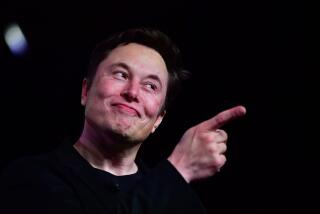Genius Is as Genius Does : YOUNG NIETZSCHE: Becoming a Genius, <i> By Carl Pletsch (The Free Press: $22.95; 300 pp.)</i>
- Share via
Friedrich Wilhelm Nietzsche was born into a society that valued its geniuses--Byron, Mozart, Rousseau and especially Goethe, the most venerated man in Germany.
By birth and inclination an intellectual aristocrat, Nietzsche came from a long line of Lutheran pastors and was destined to follow in the footsteps of his clergyman father, who died when the boy was 5. Instead, during college, Nietzsche shocked his mother by dropping his theological studies to take up classical philology, a field he later abandoned for philosophy. The preacher’s son became the genius who shocked the world by proclaiming the death of God.
In “Young Nietzsche,” intellectual historian Carl Pletsch explores the 19th-Century cult of genius, using it to illuminate the early life and thought of one of its most famous exemplars. “Nietzsche’s life demonstrates that genius is not born, but made, and by a process far less magical than the romantic ideology of genius may make it seem,” he writes. To demystify this process, he describes the important role of Nietzsche’s models, particularly Schopenhauer and Wagner, and finally how “rebelling against his mentors too, (Nietzsche) created himself as a genius.”
The genius as a culturally defined role was invented in the 18th Century, Pletsch explains, when it first became possible for extremely gifted people to pursue careers in their specialties without benefit of church or patron. Voltaire, the inspiration for the philosophes and one of Nietzsche’s heroes, was the man who “established the intellectual as an independent force in Western society.”
The growth of the middle class provided a market for books, music and ideas as well as an orthodoxy to resist. After the Enlightenment created the social space for it, the genius emerged--the great man inspired to create new forms but tormented and unappreciated in his time. Within 100 years, this romantic figure succeeded God and king as the heroic ideal.
The genius as conceived by the 19th Century was a quasi-divine being with the inborn power to create, a power previously restricted to God. This gift often was accompanied by psychological stress and social isolation, frequently unto insanity. Though Nietzsche seems to conform to this pattern, Pletsch’s close look at his career suggests that Thomas Edison was right about genius: It involves a lot of work. Geniuses learn from their predecessors.
Nietzsche’s long and passionate apprenticeships to Schopenhauer and Wagner not only acquainted him with genius, they exposed him to the theory of genius, which enabled him to marshal his energies into a well-focused mission and gave him the license to avoid the usual responsibilities. Becoming a genius was a self-conscious undertaking.
Nietzsche himself believed that history is a genealogy of geniuses, in which each genius creates the mental world in which his successors live.
Pletsch emphasizes the influence of the cultural model because his earlier studies convinced him that a purely psychoanalytic explanation is inadequate to account for the conjuncture of Nietzsche’s ideas. Nevertheless, Pletsch refers to psychoanalytic notions when they seem apt, suggesting that the early loss of his father made Nietzsche repeatedly seek to replace him with powerful father figures.
Nietzsche also displayed a Freudian proclivity for intellectual patricide. Many of his works, beginning with his first, “The Birth of Tragedy,” disavow the ideas of his various mentors. Eventually, he overthrew them all; his search for a surrogate father ended when he invented the character Zarathustra, a hero who explicitly rejects disciples.
After he renounced discipleship, Nietzsche discovered that his own creative mission was nothing less than “the transvaluation of all values, overturning culture itself.”
He rejected Christianity as decadent, and, in place of its slave morality, wished to create a new heroic morality, a morality beyond good and evil. He was a nihilist, but an oddly affirmative one, willing to impose meaning on intrinsic meaninglessness and seeking to be truthful about the absence of truth. “Joyous distrust is a sign of health,” he wrote. “Everything absolute belongs to pathology.”
These enormously influential ideas are still controversial today. Regarded as a mentor by philosophers of various stripes, including pragmatists and existentialists, Nietzsche has been hailed and blamed for inspiring World War I, Nazism and post-modernism. Freud considered him the greatest psychologist who ever lived. Of course, in his own day, he went largely unrecognized. Like his fellow 19th-Century geniuses, Berlioz, Marx and Darwin, Nietzsche worked alone in the face of opposition.
“Young Nietzsche” shows how the 19th-Century cult of genius operated to promote innovation, producing and sustaining remarkable men. It provides a detailed, scholarly rendering of its subject, but not an evocation of his greatness of spirit. This, finally, remains mysterious.
More to Read
Sign up for our Book Club newsletter
Get the latest news, events and more from the Los Angeles Times Book Club, and help us get L.A. reading and talking.
You may occasionally receive promotional content from the Los Angeles Times.







